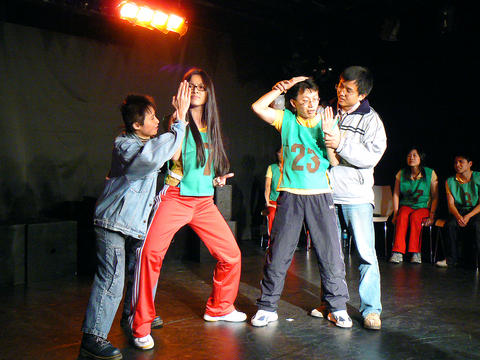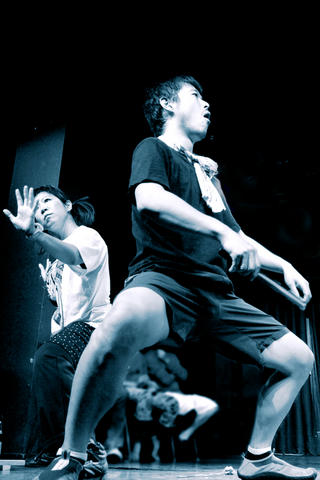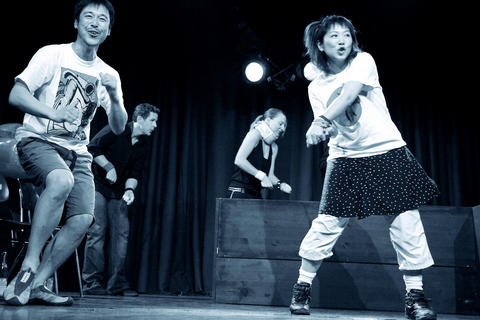Ever felt like yelling out in a theater performance, but were too afraid? Or felt that shouting out your opinion was inappropriate or rude? Well beginning tonight at The Mayor's Residence Art Salon prepare for a performance in which the audience can become the actor and passive spectators are frowned upon.
"I always emphasize [to the audience] that in this show we work together," said Taiwan's Guts Improv Theater (勇氣即興劇場) founder and this weekend's Theatersports' emcee Wu Hsiao-hsien (吳效賢), referring to the relationship between audience and actors.
It's a sentiment shared by Japan's Impro Works and Hong Kong's Champion Arts Association (青皮人藝術合作社), the other two companies that have come to Taiwan to compete in the Theatersports contest.

PHOTOS: COURTESY OF GUTS IMPROV THEATER
"Competition is just the format," said Shirley Chan (陳明慧) of Champion Arts. "We are still working together and we are playing." Though it"s cloaked in competitiveness, the purpose of the performance is to suck the audience into the action on stage, turning them into creators as well as observers.
Let's rumble
Theatersports is a performance style that finds its origins in improvisational theater (improv or impro, depending on the dictionary you use) and stresses the importance of the audience's active participation. It involves two different formats: long and short. Short form is more competitive in the sense that two teams take the stage at the same time. The long form involves one team and lasts for 30 minutes. This weekend's performances will be held in English and Chinese.

PHOTO: COURTESY OF GUTS IMPROV THEATER
Though each improv company approaches Theatersports in a slightly different manner, the basic format includes teams of actors - professional or otherwise - performing in front of judges while an emcee implores the audience to shout out their ideas, suggestions and criticisms, particularly to the judges.
"In Japan, the judges' status [in society] is very high, so it is seen as very rude to criticize them. So I explain before the performance begins that judges are supposed to encourage the audience to criticize them," said Yuri Kinugawa, art director of Japan's Improv Works.
Champion Arts Association uses a different format. "We ask the audience to be the judges. We will explain [the format] before the show and ask for suggestions because that will involve more [of the] audience. Though some audience members really don't want to get involved in the performance or even give any suggestions, they are always willing to give marks," said Chan.

PHOTO: COURTESY OF GUTS IMPROV THEATER
The Taipei competition will employ three judges and suggestions will come from the audience.
Communicating with the audience members and making it clear they are to be active participants, the three companies agree, remains the biggest obstacle confronting Theatersports in Asia.
Cultural obstacles?
"Because there are conceptual and cultural differences here, it is necessary for the audience to gain an understanding of what they are going to encounter on the stage and that, yes, they are going to be participants," Chan said.
She added that audiences in Hong Kong are so used to traditional theater they often remain silent in the theater, even though the emcee is imploring them to speak up. "It is very different from what we have seen ... in Canada and the US, where the audience members will shout and scream and get involved," Chan said.
Still, with an energetic emcee on the mic, even the most reticent of crowds may turn from speechless statues to raucous participants.
"You (the audience) make the show, it's not just us performing for you. We need your input to complete this show," Wu said.
It's an attitude that should keep the audience members on the edge of their seat.

On April 26, The Lancet published a letter from two doctors at Taichung-based China Medical University Hospital (CMUH) warning that “Taiwan’s Health Care System is on the Brink of Collapse.” The authors said that “Years of policy inaction and mismanagement of resources have led to the National Health Insurance system operating under unsustainable conditions.” The pushback was immediate. Errors in the paper were quickly identified and publicized, to discredit the authors (the hospital apologized). CNA reported that CMUH said the letter described Taiwan in 2021 as having 62 nurses per 10,000 people, when the correct number was 78 nurses per 10,000

As we live longer, our risk of cognitive impairment is increasing. How can we delay the onset of symptoms? Do we have to give up every indulgence or can small changes make a difference? We asked neurologists for tips on how to keep our brains healthy for life. TAKE CARE OF YOUR HEALTH “All of the sensible things that apply to bodily health apply to brain health,” says Suzanne O’Sullivan, a consultant in neurology at the National Hospital for Neurology and Neurosurgery in London, and the author of The Age of Diagnosis. “When you’re 20, you can get away with absolute

May 5 to May 11 What started out as friction between Taiwanese students at Taichung First High School and a Japanese head cook escalated dramatically over the first two weeks of May 1927. It began on April 30 when the cook’s wife knew that lotus starch used in that night’s dinner had rat feces in it, but failed to inform staff until the meal was already prepared. The students believed that her silence was intentional, and filed a complaint. The school’s Japanese administrators sided with the cook’s family, dismissing the students as troublemakers and clamping down on their freedoms — with

As Donald Trump’s executive order in March led to the shuttering of Voice of America (VOA) — the global broadcaster whose roots date back to the fight against Nazi propaganda — he quickly attracted support from figures not used to aligning themselves with any US administration. Trump had ordered the US Agency for Global Media, the federal agency that funds VOA and other groups promoting independent journalism overseas, to be “eliminated to the maximum extent consistent with applicable law.” The decision suddenly halted programming in 49 languages to more than 425 million people. In Moscow, Margarita Simonyan, the hardline editor-in-chief of the